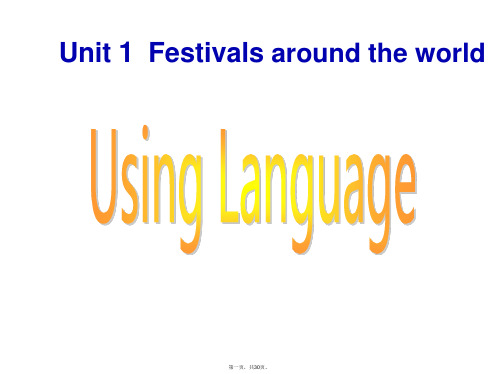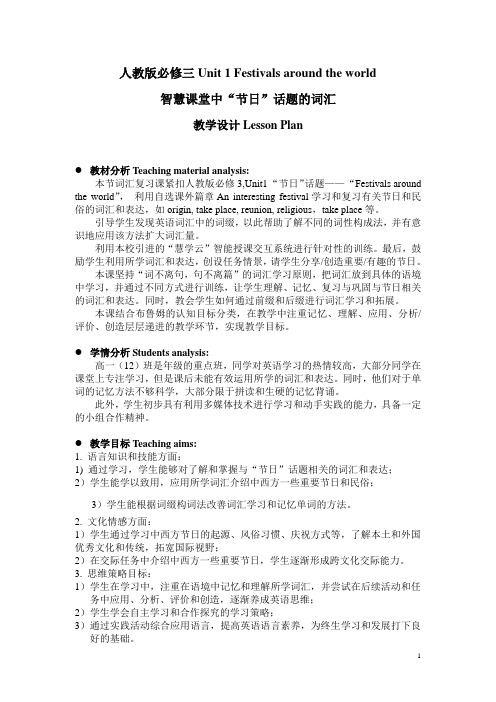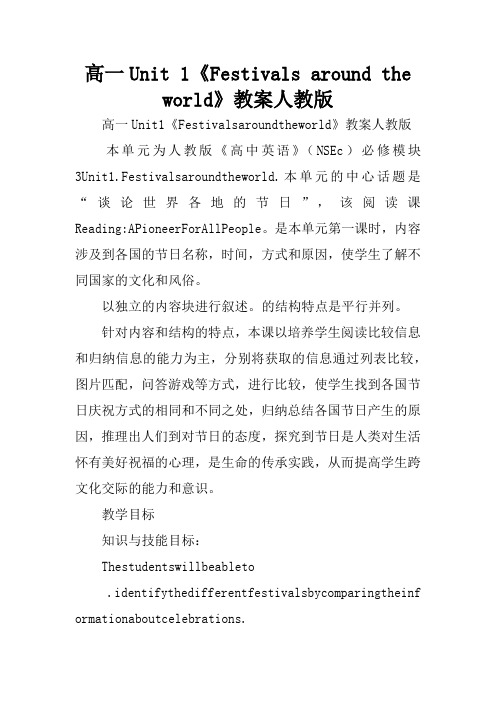人教版必修3_Unit1_Festivals_around_the_world练习
- 格式:doc
- 大小:44.00 KB
- 文档页数:2



高中英语教学案例(新课标人教版必修3)Unit 1 . Festivals around the worldI. Learning objectives and demands1. Learn how festivals began and how festivals celebrated.2. Developing the ability of reading: scanning and skimming3. Learn more knowledge of foreign cultures and develop the sense of protecting Chinese culture.II. Teaching important point1、Learn how different festivals began and celebrated .2、Let students learn more about history and basic knowledge of festivals.III. Teaching difficult point1、Learn the basic method of reading.2、Enable students to talk about festivals and celebrations.IV. Teaching aidsA computer and projectorV. Teaching procedures:Step 1.Leading-inHave a free talk with students. Ask them the following questions:T: Hello, everybody! Welcome back to school! Did you have a good time during your winter holidays?Ss: Yes. Of course!T: When did you feel most happy and excited?Ss: At the Spring Festival.T: Who can tell us why? V olunteers!S1: Because it’s the most important festival i n our country.S2: Because I got much lucky money from my parents, grandparents and my relatives.S3: Because I needn’t study at festivals and there was lots of delicious food to eat. How great!S4: Because I met my cousins and old friends who I hadn’t see n for a long time and we had a very good time together.T: Excellent work! I am glad to hear that. Now let’s talk about FESTIV ALS, which are meant to celebrate important events. Please think about other Chinesefestivals.Then discuss in pairs what other Chinese festivals you know and choose three festivals to talk about.Step 2.Warming up1.Let students brainstorm the other Chinese festivals:(Lantern Festival, Pure Brightness Festival, Dragon Boat Festival, Mid-Autumn Festival, New Year′s Day, Chung Yeung Festival…)2.Let students work in groups and find the information about Chinese festivals.3.Ask students to fill in the following form and ask some to share their opinions with the whole class. The first one is given as an example.Step 3. Pre-readingT: Ask the students whether they know any festivals of foreign countries.Ss: Christmas Day 、Easter Day、Valentine’s Day 、Halloween……Tell the students we’ll learn something about some festivals in foreign countries. Step 4. ScanningLet the students read the passage silently and quickly and ask them for the main idea. And then ask them how many kinds of festivals are mentioned in the passage. Step 5. ListeningPlay the MP3 of the passage on the computer. And then do the true or false questions :1. The ancient people needn’t worry about their food.2. People celebrate Halloween with a different purpose from the past.3. Gandhi was a great leader who Indian people honor a lot.4. China and Japan share the same custom of celebrating Mid-Autumn Festival.5. Easter just celebrates the rebirth of Jesus6. In some Western countries there are very exciting carnivals, which take place fourteen days before Easter.Keys: 1.F2.T3.T4.T5.F6.FStep 6. Careful reading1.Let the students read the passage carefully and finish the form.(Let students look through the chart and then read the text silently. Three minuteslater, check the answers with the whole class.)2.Answer the following questions:1) At what occasions would the ancient people celebrate?2) What are the names of the festivals of the dead in different countries?3) Who do you think should have a festival to be honored? Why?4) What do people usually do when Chinese Mid-Autumn Festival arrives?5) Why is the Spring Festival popular? Talk about all the cultural practices you know of at the Spring Festival.Step 7. ConsolidationAsk students to talk about festivals in their own words according to the text. Then let them complete the following passage with proper words or phrases.There are al kinds of festivals and around the world, which are held for different . The ancient festivals were mainly held at three times a year-the end of the cold ,planting in spring and in autumn. Some festivals are held to the dead or the ancestors, who might return either to help or , while other festivals are held to honor famous people or to the ,such as Dragon Boat Festival, Columbus Day, and so on. Harvest andfestivals are happy events because their food is for the winter and the work is over, to which Mid Autumn Festival belongs. And the most and important festivals are the ones that the end of winter and to the coming of such as the Lunar New Year, at which people have a very .Suggested answers: celebrations; reasons; weather; harvest; honor; to satisfy; to do harm; gods; Thanksgiving; gathered; agricultural; energetic; look forward to; spring; good time.Step 8. Homework1.Learn the useful new words and expressions in this part by heart.2.Read the reading passage again and try to talk about festivals both in and out of China.。

人教版必修三Unit 1 Festivals around the world智慧课堂中“节日”话题的词汇教学设计Lesson Plan●教材分析Teaching material analysis:本节词汇复习课紧扣人教版必修3,Unit1 “节日”话题——“Festivals around the world”,利用自选课外篇章An interesting festival学习和复习有关节日和民俗的词汇和表达,如origin, take place, reunion, religious,take place等。
引导学生发现英语词汇中的词缀,以此帮助了解不同的词性构成法,并有意识地应用该方法扩大词汇量。
利用本校引进的“慧学云”智能授课交互系统进行针对性的训练。
最后,鼓励学生利用所学词汇和表达,创设任务情景,请学生分享/创造重要/有趣的节日。
本课坚持“词不离句,句不离篇”的词汇学习原则,把词汇放到具体的语境中学习,并通过不同方式进行训练,让学生理解、记忆、复习与巩固与节日相关的词汇和表达。
同时,教会学生如何通过前缀和后缀进行词汇学习和拓展。
本课结合布鲁姆的认知目标分类,在教学中注重记忆、理解、应用、分析/评价、创造层层递进的教学环节,实现教学目标。
●学情分析Students analysis:高一(12)班是年级的重点班,同学对英语学习的热情较高,大部分同学在课堂上专注学习,但是课后未能有效运用所学的词汇和表达。
同时,他们对于单词的记忆方法不够科学,大部分限于拼读和生硬的记忆背诵。
此外,学生初步具有利用多媒体技术进行学习和动手实践的能力,具备一定的小组合作精神。
●教学目标Teaching aims:1. 语言知识和技能方面:1) 通过学习,学生能够对了解和掌握与“节日”话题相关的词汇和表达;2)学生能学以致用,应用所学词汇介绍中西方一些重要节日和民俗;3)学生能根据词缀构词法改善词汇学习和记忆单词的方法。

高一Unit 1《Festivals around theworld》教案人教版高一Unit1《Festivalsaroundtheworld》教案人教版本单元为人教版《高中英语》(NSEc)必修模块3Unit1.Festivalsaroundtheworld.本单元的中心话题是“谈论世界各地的节日”,该阅读课Reading:APioneerForAllPeople。
是本单元第一课时,内容涉及到各国的节日名称,时间,方式和原因,使学生了解不同国家的文化和风俗。
以独立的内容块进行叙述。
的结构特点是平行并列。
针对内容和结构的特点,本课以培养学生阅读比较信息和归纳信息的能力为主,分别将获取的信息通过列表比较,图片匹配,问答游戏等方式,进行比较,使学生找到各国节日庆祝方式的相同和不同之处,归纳总结各国节日产生的原因,推理出人们到对节日的态度,探究到节日是人类对生活怀有美好祝福的心理,是生命的传承实践,从而提高学生跨文化交际的能力和意识。
教学目标知识与技能目标:Thestudentswillbeableto.identifythedifferentfestivalsbycomparingtheinf ormationaboutcelebrations.2.explainthereasonwhythefestivalscomeintobeingbyfin dingoutthesimilaritiesanddifferences.3.describetheirfavoritefestivalsbyusingthelanguagef romthetext.教学重点和难点)为全体学生进行有效性阅读策略的指导,包括语篇分析、猜测词义,逻辑推理、归纳概括等技巧。
2)通过比较信息,归纳总结各国节日产生的原因,推理出人们到对节日的态度和节日的意义。
教学过程教学步骤教学活动设计意图Pre-reading:Step1.Brainstorm:motivatetheSsbyaskingsomequestions.Q1:Doyouanyfestivalsaroundtheworld?Step2.matchthecelebrationwiththefestivals.Q2:DoyouknowhowpeoplecelebratetheseFestivals?Doaquiz.Step2.DiscussionSsdiscussthefollowingquestionsQ1:Howdotheycomeintobeing?Q2:whatdotheyhaveincommon?Andwhataretheredifference amongthem?问题引发了学生的思考,调动学生的已知,将学生的思维活动引导到课文主题上来。

Unit 1 Festivals around the world圣诞的由来12月25日,是基督教徒纪念耶稣诞生的日子,称为圣诞节。
从12月24日于翌年1月6日为圣诞节节期。
节日期间,各国基督教徒都举行隆重的纪念仪式。
圣诞节本来是基督教徒的节日,由于人们格外重视,它便成为一个全民性的节日,是西方国家一年中最盛大的节日,可以和新年相提并论,类似我国过春节。
西方人以红、绿、白三色为圣诞色,圣诞节来临时家家户户都要用圣诞色来装饰。
红色的有圣诞花和圣诞蜡烛。
绿色的是圣诞树。
它是圣诞节的主要装饰品,用砍伐来的杉、柏一类呈塔形的常青树装饰而成。
上面悬挂着五颜六色的彩灯、礼物和纸花,还点燃着圣诞蜡烛。
红色与白色相映成趣的是圣诞老人,他是圣诞节活动中最受欢迎的人物。
西方儿童在圣诞夜临睡之前,要在壁炉前或枕头旁放上一只袜子,等候圣诞老人在他们入睡后把礼物放在袜子内。
在西方,扮演圣诞老人也是一种习俗。
圣诞的由来圣诞节的由来耶稣的生日究竞是哪一天,其实早无据可查。
为什么要把12月25日定为圣诞节呢?这是在5世纪中叶由教会规定的。
公元354年,在“菲洛卡连”日历中第一次写明12月25日是耶稣的生日,到5世纪西方普遍接受了这个日期为圣诞节。
圣诞树据称,圣诞树最早出现在古罗马12月中旬的农神节,德国传教士尼古斯在公元8世纪用纵树供奉圣婴。
随后,德国人把12月24日作为亚当和夏娃的节日,在家放上象征伊甸园的“乐园树”,上挂代表圣饼的小甜饼,象征赎罪;还点上蜡烛,象征基督。
到16世纪,宗教改革者马丁.路德,为求得一个满天星斗的圣诞之夜,设计出在家中布置一颗装着蜡烛的圣诞树。
不过,西方关于圣诞树的来历流行着另一种说法:有个善良的农民,在圣诞节那天,热情地招待了一名流浪的孩子,临别时,孩子折下一树枝插在地上树枝立即长成大树,孩子指着这树对农民说,每年今日,树上都长满礼物,以报答你们的盛情。
所以,今天人们所见的圣诞树上总是挂满了小礼物。
Unit1 Festivals around the world语法篇____________________________________________________________________________________________________________________________________________________________________掌握本单元重点语法----情态动词,并能熟练应用情态动词相关语法解决相应的语法练习一、重点语法:情态动词情态动词是一种本身有一定的词义,表示说话人的情绪、态度或语气的动词,但不能单独作谓语,只能和其他动词原形构成谓语。
本单元学习情态动词的用法。
1.may 与might的用法2. can与could的用法…3. will与would的用法4.shall与should的用法5. must, may (might) 和can表示“推测”的用法6.should与ought to用法;7.need与dare用法ed to与would用法例1.(2019北京卷27.)________ I have a word with you? It won’t take long.A. CanB. MustC. ShallD. Should解析:本题考察的是情态动词基本意义辨析。
can能够,可能;must必须,一定;非得;shall将要;:should应该;句意:我可以和你谈谈吗?不会花很多时间的。
根据句意可知本题使用Can I…?表示询问对方是否允许。
如:Can I use your dictionary? 我可以使用你的字典吗?答案:A。
例2.(2019大纲卷)30. Although you _____ find bargains in London, it’s not generally a cheapplace to shop.A. shouldB. needC. mustD. can解析:should应该,竟然;need需要;must必须,一定;非得,偏偏;can能够,可能,有时会…;根据句意“尽管你有时可能会在伦敦找到便宜货,但总得说来那不是一个购物的便宜的地方。
Unit1 Festivals around the worldTeaching aims:1. TopicFestivals; how festivals begin; how to celebrate festivals2. Useful words and expressions:Starve plenty satisfy ancestor lamp lead feast bone origin trick poet arrival national gain independence gather agricultural European custom award watermelon handsome rooster admire energetic forward Easter clothing religious social Christian daily permission possibility fool apologise drown sadness obvious wipe lovely couple weep announcer forgiveTake place in memory of dress up play a trick look forward to day and night as though have fun with turn up keep one’s word hold one’s breath 3. Functional items:1)RequestCould /Would you please…?Could I have…?Could we look at…?I look forward to ….May I see…?2)ThanksIt’s very kind of you…Thank you very much/thanks a lot.I’d love to.It was a pleasure….Don’t mention it.You are most welcome.4. Structures情态动词can, could, may, might, will, would, shall, should, must, can’t 等的用法。
Unit 1 Festivals around the world 练习一、单词拼写请根据汉语提示或首字母写出单词的正确形式1. I don't share her _____________宗教上的beliefs.2. He ___________赞美;钦佩your poems very much.3. My ____________信心is that the visiting team will lose.4. He _______________道歉to her for not going to her party.5. It is not his custom to d_____________ his sadness in wine.6. She entered the lab without _____________ (许可).7. He has ___________获得;得到rich experience in these years.8. It was quite ______________显而易见的that she was not going home.9. He is _____________搜集materials for a new book.10. He got a lot of ______________ (奖状) for his excellent study.二、用所给短语的适当形式填空day and night take place in memory of dress up look forward tokeep one’s word hold one’s breath have fun with play a trick on as though1. You don’t need to ___________________; just to go to the pub—jeans and a T-shirt will do.2. We may never discover what _______________________ that night.3. A ceremony was held ________________________ those who had died in the earthquake.4. She was _________________________ seeing the grandchildren again.5. I felt _________________________ I’d been lying in the sun for hours.6. He promised to help and he ______________________.7. How long can you _________________________ in water?8. It’s acceptable _______________________your friends on April 1st.9. On Sundays children often __________________ each other. They are very happy.10. After the heavy rain the machines were kept running _____________________ to pump water.三、完成句子(每题3分,总分30分)1. Drinking and smoking will __________ ____________ (有害) to your health.2. Drinking and smoking can ________ ________ (导致) health problems.3. The manager said he would come to the meeting but he hasn’t _______ ________(到场).4. He talks _________ ________ _________ _________ ___________ all about it. (好像知道了全部)5. Every year many people in the world _________ ________ _________(饿死).6. In order to complete the task on time, they work ________ _______ ________(日夜).7. We thank you for your cooperation and we __________ ___________ _________ your good news.(静候佳音)8. I ________ __________ _________ ___________(本来打算来)yesterday, but I had an unexpected visitor.9. The ___________(满意的) look on his face suggested that his performance was____________(令人满意的). 四、句型转换1. A: In India there is a national festival on October 2 to honour Mahatma Gandhi, …B: In India there is a national festival on October 2 ______ _______ ______ Mahatma Gandhi, …2. A: Obviously, the manager of the coffee shop was waiting for Li Fang to leave.B: It ______ ______that the manager of the coffee shop was waiting for Li Fang to leave.3. A: He had expected to meet her all day.B: He had ______ _______ ______ meeting her all day.4. A: The pictures make me think of my school days.B: The pictures_____________ me _____________ my school days.5. A: We can believe in him. He will do what he has promised.B: We can believe in him. He will ___________ _____________ _________________.五、语法填空There are two basic stages to learn English. The first stage of learning this language would be very ___1___________ (interest). Once you have a good command of the alphabets(字母), ___2__________ (gradual) you can learn many words. It would always be better to follow the method of reading first, then writing. When you feel ___3__________ you have understood the words, you can make sentences. This is the most amusing stage to learn. You just think of a sentence in your mother language, and try to set ___4__________ the same sentence in English. There could be some mistakes, ___5_________ you should not worry about it. You’d better write the same sentence by ___6_______________ (make) use of many different words till you are satisfied ___7_________ your sentence. If you follow this way, very soon you can create sentences of your own.___8________ second step is learning the grammar. Compared with ___9___________ languages, English is quite simple and very systematic(系统化的). There are certain rules and regulations for each and every topic in grammar of this language. As long as you follow the rules and regulations, ___10___________ would be a difficult task to make mistakes.六、改错Raising your head in August 16 and stare the stars, and you will find something romance going on in the sky. Valentine'S Day in China, the seven day of the seventh lunar month, falls on August 16 this year.That is, on the Monday evening, Niu Lang and Zhi Nu would meet on a bridge of magpies across the Milky Way. Chinese grannies will remind children that they aren’t able to see any magpies on that evening,so all the magpies have left to form a bridge in the heavens by their wing.参考答案:单项:ABCCC ADCDC选词填空1. dress up 2. took place 3, in memory of 4. looking forward to 5. as though6. kept his word7. hold your breath8. playing a trick on9. have fun with 10, day and night完成句子:1. no harm was done 2. poet in memory of, used to be, as well as 3, admires him for, sense of 4. as if he had known 5. play tricks on 6. What fun it is 7. look forward to 8. meant him to become an engineer 9. comfortable to sit on 10. satisfied, satisfying完形填空DBAAB DDCBA BDCDD ABABC阅读理解:BCDC ABB BCB ACBAARaising—Raise in—on stare—stare at romance—romantic seven—sevenththe Monday—Monday would—will so—because by—with wing—wings。